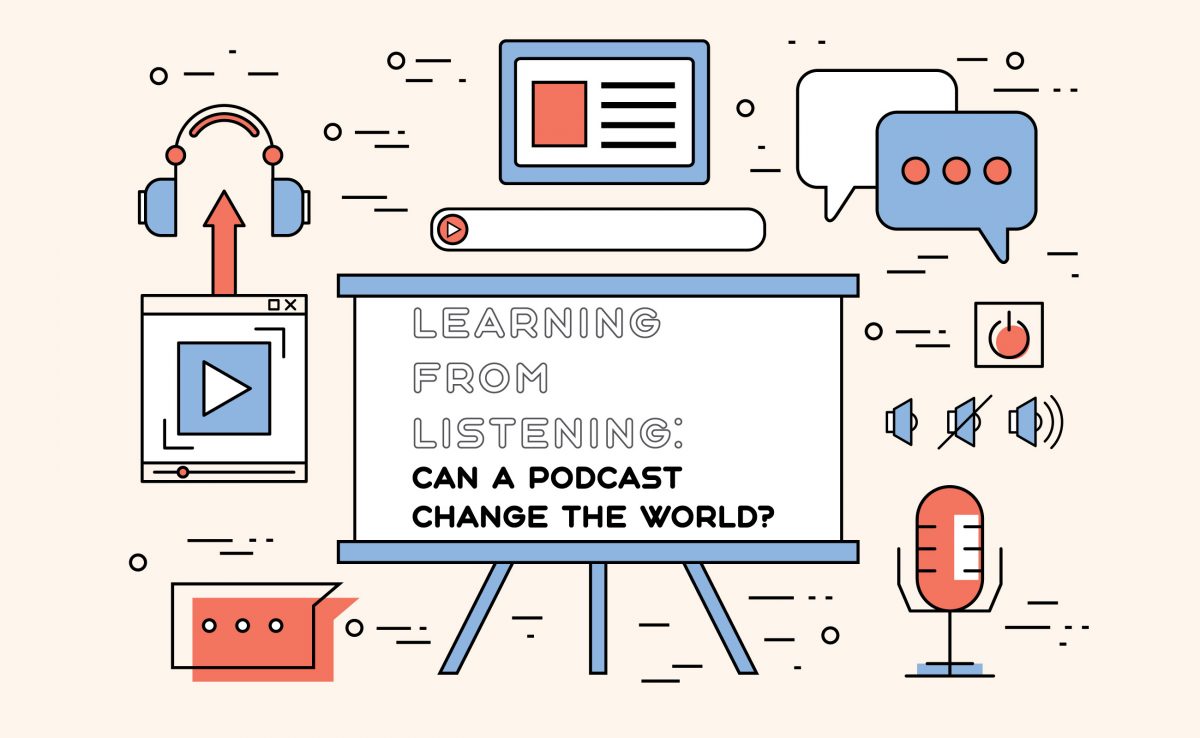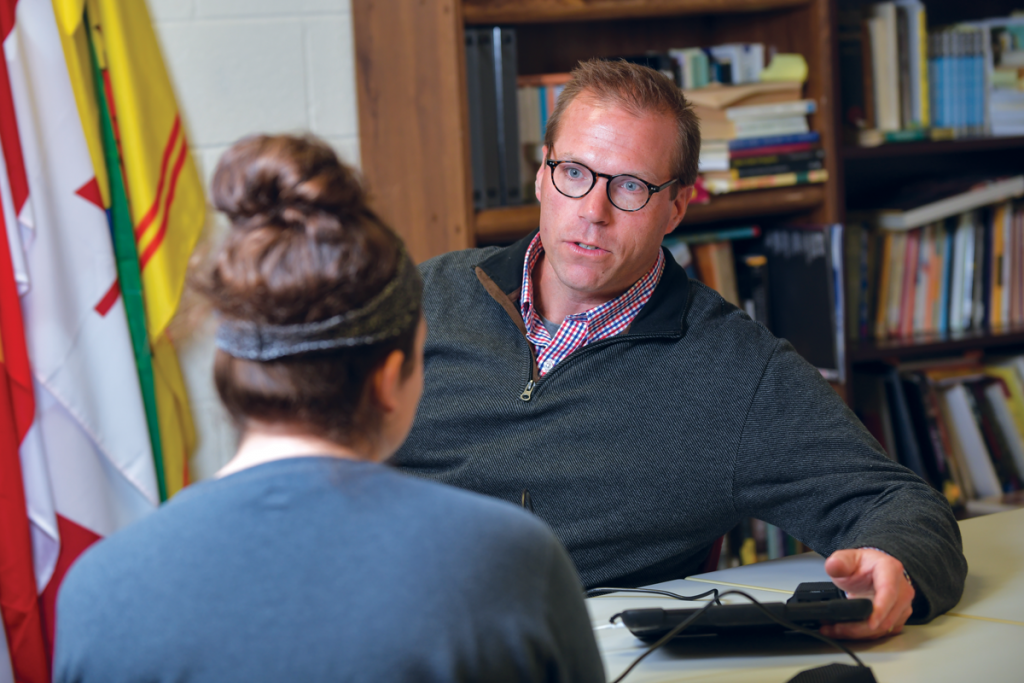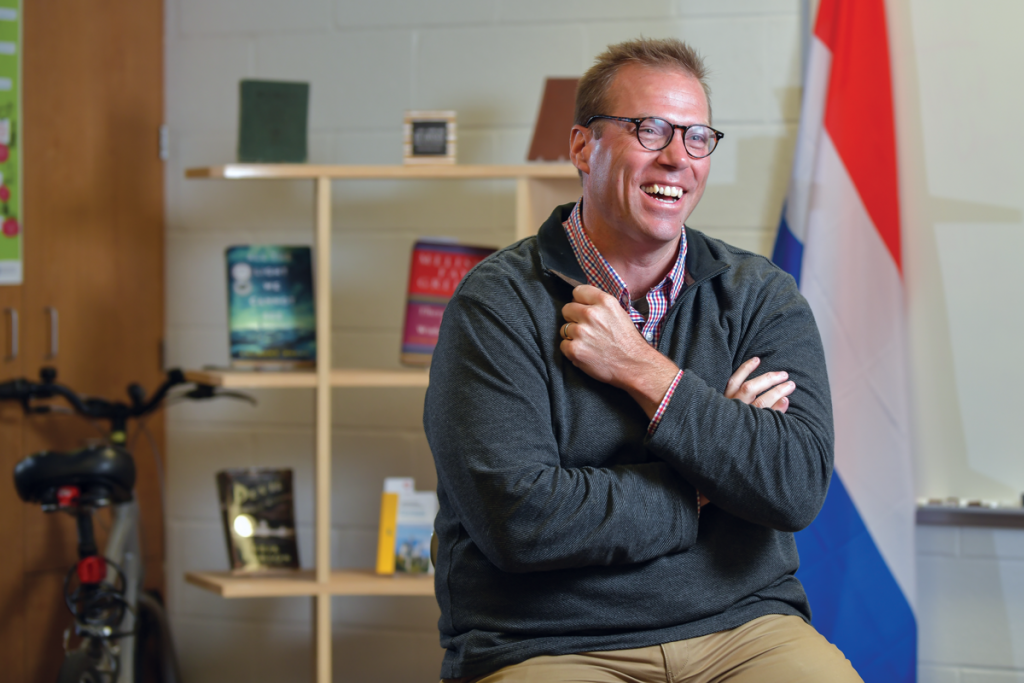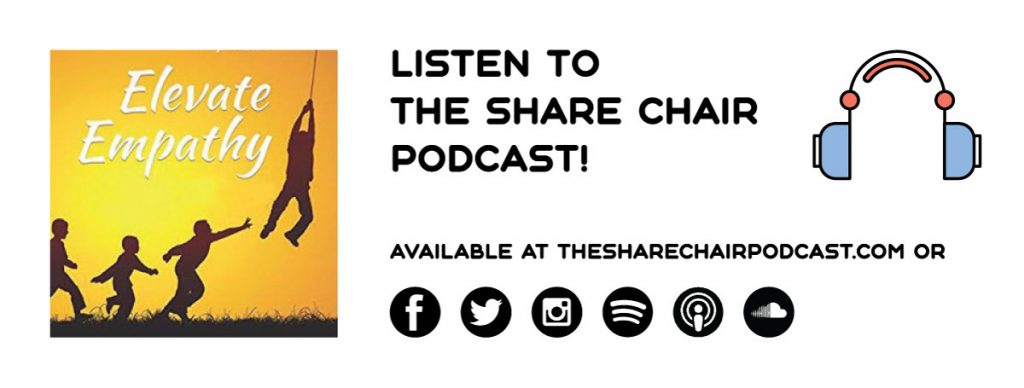Learning from Listening
Can a Podcast Change the World?
If there was a line graph that charted student success and well-being, David Theune ’99 would’ve placed his student solidly on its upward curve. Smart and sociable, with a solid group of friends, the high school junior was liked and respected by her teachers and many of her peers.
“I thought she had everything going for her,” said Theune (pronounced too-nee), who teaches English at Spring Lake High School in Spring Lake, Michigan.
When she asked him to read a journal entry she’d written as part of her assigned classwork, what he read hit Theune like a punch in the gut.
“She mentioned in her journal that she walks around humiliated,” Theune said. “She used the word, bullying. I had no idea.
“I told her, ‘I’m so sorry I didn’t see this. I didn’t know this at all.’”
“Teachers don’t see it,” she replied. “They can’t see it.”
Every instance of bullying consists of verbal or physical aggression repeated over time and accompanied by an imbalance of power — but that doesn’t mean all bullying looks the same. In some cases, it’s the physical assault of an overgrown schoolyard thug; in others, it’s something less visible, an under-the-radar version that’s harder to see but is no less cruel for all its subtlety.
The implications of this student’s unseen suffering gnawed at Theune. “If I had no idea for her, how many other students do I have no idea about what’s happening to them?” he asked. How many more are being bullied?
He couldn’t know that the answers to those questions would launch him on an unexpected journey that led earlier this year to a six-month sabbatical to the Netherlands, funded by a Fulbright Distinguished Teaching Award.
Theune’s road to teaching wasn’t a straight one. After Hope, where he majored in theatre, he entered a graduate program in theatre at Case Western Reserve University in Cleveland, Ohio, where he picked up a summer job teaching theatre to at-risk youth. He fell in love with teaching, dropped out of Case Western, and returned to West Michigan to earn English and education degrees from Grand Valley State University.
Although he received his education degrees from another school, Theune is quick to point to ways his Hope experience has shaped his trajectory. “I would not be the teacher I am today without Hope’s theatre department,” he said.
One example is his commitment to doing something instead of just talking about it. “The theatre department taught me how to make things,” he said. “A show is a production, so theatre demands production. It taught me to ask, ‘What can I produce? What can I make? What can I do to improve this?’”
As he researched bullying, one book in particular, Sticks and Stones: Defeating the Culture of Bullying and Rediscovering the Power of Character and Empathy by Emily Bazelon, was so impactful that he invited others in the community to read it with him.
The response was more than Theune could’ve hoped: Nearly 250 people signed up to read Sticks and Stones together. All over Spring Lake, they met in school gymnasiums and coffee shops and over dinner around dining room tables to discuss the book and identify ways to address bullying.
“What came out of our book study was that the way to defeat bullying is actually not by talking about bullying. It’s through empathy,” he said. “It’s through understanding — it’s through listening to other people’s stories and recognizing that although I don’t know someone, we still have a connection.”
That reflexive pull toward empathy is another thing Theune attributes to Hope’s theatre program: “Empathy came from my parents first, of course, but when you’re in the theatre, it’s the job of an actor to be in someone else’s shoes,” he said.
The unseen pain from being bullied that a student shared during a class assignment gnawed at high-school teacher David Theune ’99:
“If I had no idea for her, how many other students do I have no idea about what’s happening to them?
he asked. The question led to an ongoing effort and a Fulbright Distinguished Teaching Award to help students in both the U.S. and the Netherlands, and perhaps beyond
After the book club disbanded, Theune co-wrote and co-edited a book with a student. Elevate Empathy: The Power of Kindness, prefaced with an introduction by Sticks and Stones author Bazelon, relays personal stories from several people who participated in the book club.
Later, with another student, Theune launched The Share Chair Podcast. At the time this article went to print, The Share Chair had published nearly 200 episodes, each one giving voice to someone — typically a student from Spring Lake or another high school, although occasionally an adult — who simply shares his or her story. The podcast is recorded on an iPad, mostly in Theune’s classroom, and student volunteers edit and produce each episode.
“The Share Chair Podcast has one simple message,” reads the show’s description: “Learn from listening. Hear our stories — and hear yourself in them.”
It’s an attempt to demonstrate that listeners can learn not only about the person being interviewed, but about themselves. Specifically, Theune wants listeners to “learn they are not alone, that there is someone in similar circumstances,” he said. “Everyone has a story. Those stories are valuable, and we can find connection.”
Some stories are somber and serious. Students share about being bullied, just like the high school junior who inspired Theune to pursue the project, or about how they used to bully others; about loneliness, LGBTQ+ experiences, autism, terror, disease, suicide, adoption. But just as importantly, many are lighthearted. In one, Malachi talks about his passion for soccer. In another, Kyle shares the joy that he finds in the arts.
This mix of the serious and lighthearted stories is by design. “In a seemingly more challenging world, I want to prove to teens that there are others who are feeling the same emotions they are — whether that be solitude, elation or anything in between,” Theune said.
His desire to connect people, to help people see themselves in another person’s story, led him to wonder if The Share Chair Podcast could build empathy beyond Spring Lake. What if these connecting threads of empathy could stretch more than 4,000 miles?
Theune received a Fulbright Distinguished Award in Teaching and received funds for a Semester Research Program grant, which gives American teachers the opportunity to travel internationally for scholarship or to work on a project.
“I had one goal with my research: To prove that students are not alone in this world,” Theune said. “Sometimes kids only see what’s right in front of them, and if they don’t see kids who are like them, that’s miserable. It can lead to truly devastating things. But even if it’s not truly devastating, even if it’s not harmful, it hurts.”
This is just as true in the Netherlands as it is in America. So Theune, his wife, Nikki Rodgers ’99 Theune, and their three daughters went to live in Utrecht from January through June, 2019. While there, he split his time between his office space at Utrecht University and high schools, where he interviewed Dutch students for The Share Chair Podcast.
“I would go into a classroom to talk about our school culture and let the students ask me questions,” he said. “I’d spend a whole hour answering their questions, then explain what I was doing and ask if anyone was interested. Students want to tell their stories.”
By the time his sabbatical ended, Theune had gathered some 45 interviews with students from about 15 different schools in the Netherlands. He also brought back to the states a renewed vision and globe-sized dreams: That teachers around the world would record their students’ stories and send them to The Share Chair to edit and publish.
For such a sweeping scope, Theune’s aim is also realistic: “Bullying is not going to go anywhere. This isn’t going to cure it,” he said. “But if we stop addressing it, it’s going to get worse. If we do nothing, nothing happens.”




